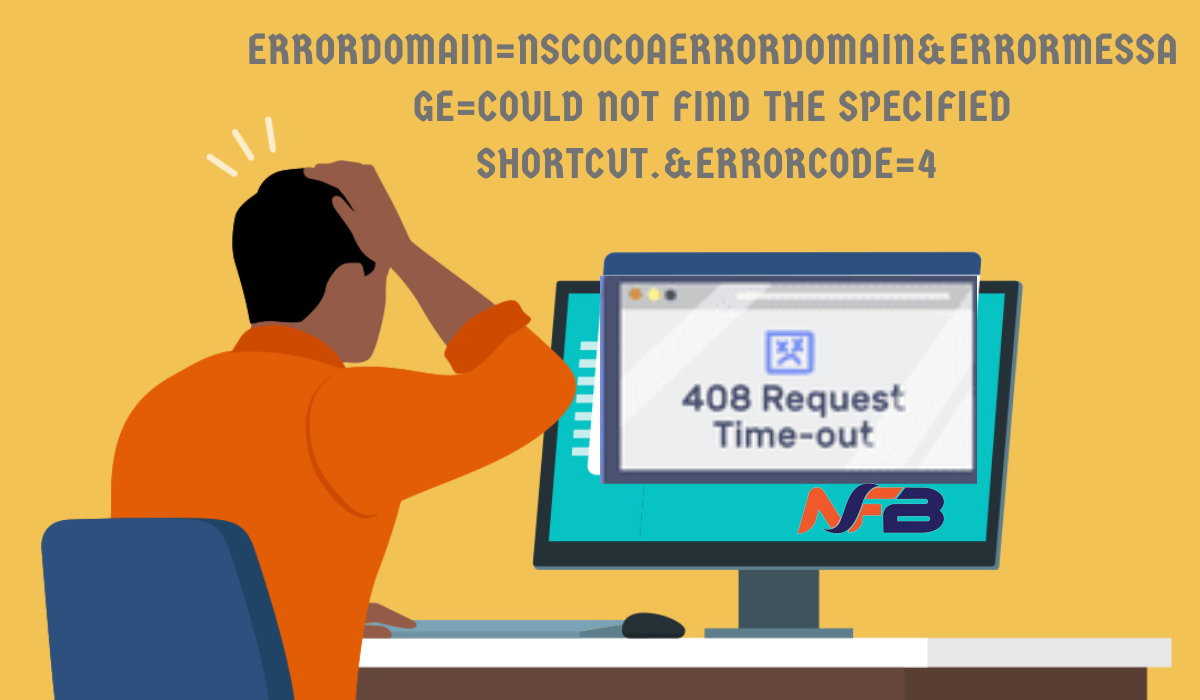Have you ever encountered a frustrating error message while working on your Mac? If you’ve stumbled upon “errordomain=nscocoaerrordomain&errormessage=could not find the specified shortcut.&errorcode=4,” you’re not alone. This cryptic string can leave even tech-savvy users scratching their heads in confusion. Understanding what this means is crucial to getting back on track and ensuring smooth sailing with your system.
In this blog post, we’ll dive into the depths of NSCocoaErrorDomain and explore why this specific error occurs. Whether it’s an issue with a missing shortcut or something more complex, we’ve got tips and tricks to help you navigate through these rough waters. Let’s unravel the mystery behind NSCocoaErrorDomain together and restore harmony to your digital workspace!
Understanding the Error: What is nscocoaerrordomain
NSCocoaErrorDomain errordomain=nscocoaerrordomain&errormessage=could not find the specified shortcut.&errorcode=4 is a part of Apple’s Cocoa framework, which serves as the foundation for macOS and iOS applications. It encompasses various error codes that developers encounter when their apps interact with system components.
When you see an error from this domain, it typically signals issues related to user interface elements or file handling within your app. The “nscocoaerrordomain” itself categorizes these errors so that programmers can easily identify and troubleshoot them.
Each error code represents a specific problem, offering insight into what might be malfunctioning under the surface. For example, the message indicating a missing shortcut points directly to either an uncreated link or a corrupted reference point within your system’s software environment.
Understanding these nuances helps not only developers but also end-users who want to address potential problems on their devices effectively.
errordomain=nscocoaerrordomain&errormessage=could not find the specified shortcut.&errorcode=4
When you encounter the message “errordomain=nscocoaerrordomain&errormessage=could not find the specified shortcut.&errorcode=4”, it indicates a problem within macOS or iOS applications. This specific error often arises during file access or shortcut retrieval attempts.
Understanding NSCocoaErrorDomain is essential for troubleshooting. It represents various errors in Cocoa, Apple’s native object-oriented API for developing apps. A missing shortcut can disrupt workflows and lead to frustration.
This error might stem from deleted files, incorrect paths, or misconfigured settings within your app. Identifying these causes helps in finding effective solutions.
Don’t let this issue halt your productivity. With a few troubleshooting steps, you can effectively resolve it and restore functionality quickly. Keep an eye on potential pitfalls that could trigger similar issues in the future as well; proactive maintenance goes a long way in preventing headaches down the line.
Troubleshooting Steps for Resolving nscocoaerrordomain Errors
When faced with the nscocoaerrordomain error, start by confirming the shortcut’s existence. Sometimes, a simple oversight can lead to this frustrating message.
Next, check your file paths for accuracy. Ensure that all directories are correctly specified and accessible. A small typo could be the culprit behind the missing shortcut.
If everything seems correct but issues persist, consider restarting your device. This often clears temporary glitches that may cause errors in accessing files or shortcuts.
You might also want to reset preferences related to your application. Corrupted settings can trigger unexpected behaviors like this error.
Ensure you’re running the latest version of macOS or any relevant software. Updates not only improve functionality but also resolve known bugs leading to these types of errors. With each step taken, you edge closer to a solution!
How to Prevent Future nscocoaerrordomain Errors
Preventing future nscocoaerrordomain errors requires a proactive approach. Regularly updating your macOS and applications can help maintain compatibility and reduce the likelihood of encountering these issues.
Organizing your shortcuts is another effective strategy. Ensure that all target paths are accurate, eliminating broken links that lead to error messages like “could not find the specified shortcut.”
Backing up important data frequently will also mitigate risks associated with unexpected errors. In case something goes wrong, having a recent backup allows for quicker recovery without significant loss.
Educate yourself about system preferences and settings related to shortcuts and file access permissions. Understanding how these elements interact can provide insights into preventing issues before they arise.
Consider utilizing maintenance software designed to optimize system performance. These tools often identify potential problems early on, allowing you to address them proactively rather than reactively.
The Importance of Regular System Maintenance
Regular system maintenance is crucial for the longevity and efficiency of your devices. Just like a car needs oil changes, your computer requires updates and clean-ups to run smoothly.
Failing to perform routine errordomain=nscocoaerrordomain&errormessage=could not find the specified shortcut.&errorcode=4 checks can lead to slow performance, unexpected crashes, and even data loss. These issues often arise from neglected software updates or unmonitored hardware conditions.
Moreover, regular maintenance helps in identifying potential problems before they escalate into costly repairs. A simple task such as clearing cache files can significantly boost speed and responsiveness.
Monitoring your systems also aids in maintaining security protocols. Cyber threats evolve constantly; keeping software updated ensures that you have the latest defenses against vulnerabilities.
Investing time in system upkeep ultimately saves money down the road while enhancing user experience. Prioritizing this aspect fosters a more reliable environment for both personal use and professional tasks.
Seeking Professional Help
When dealing with persistent nscocoaerrordomain issues, it might be time to reach out for professional assistance. Experts can provide insights that go beyond basic troubleshooting steps.
Professional help often brings a fresh perspective. They have experience diagnosing complex problems that may not be immediately obvious to the average user. Their expertise can save you time and frustration.
Additionally, professionals often have access to advanced tools and resources. This specialized knowledge can lead to quicker resolutions, minimizing downtime in your workflow.
If you’re unsure where to find help, consider checking online forums or tech support services specializing in macOS errors. A well-rated technician or service center could make all the difference in getting your system back on track efficiently.
Conclusion
Understanding the nuances of NSCocoaErrorDomain enhances your ability to troubleshoot effectively.
When faced with the specific error message regarding a missing shortcut, you’re not alone. This is a common issue that users encounter.
Taking proactive steps can save time and frustration later on. Regular system maintenance should be part of your routine.
Don’t hesitate to seek help if needed. Professional assistance can provide insights that self-troubleshooting might miss.
Embracing knowledge about errordomain=nscocoaerrordomain&errormessage=could not find the specified shortcut.&errorcode=4 these errors empowers you as a user, turning potential setbacks into learning experiences.
Understanding NSCocoaErrorDomain and its common error messages
NSCocoaErrorDomain is a crucial part of macOS and iOS development. It encompasses various error messages that developers frequently encounter while working with Cocoa frameworks. Each error code within this domain provides insight into what went wrong during an operation.
One common message is related to file handling, such as “could not find the specified shortcut.” This particular error indicates that the system cannot locate a referenced item, which can disrupt workflows significantly.
Understanding these errors helps in diagnosing issues quickly. Developers can pinpoint where their app may be failing or why users are encountering problems. By familiarizing themselves with NSCocoaErrorDomain, they gain valuable tools for troubleshooting and improving overall application performance.
Possible causes of the
When encountering the error message indicating that it could not find the specified shortcut, several underlying causes may be at play.
One common issue is a corrupted or missing file associated with the shortcut. This can happen during software updates or system migrations.
Another possibility stems from changes in directory paths. If an application has moved or been deleted, shortcuts pointing to its previous location will become invalid.
Permissions issues can also trigger this error. If your user account lacks access rights to specific directories, accessing those shortcuts may fail.
Conflicts with third-party applications might disrupt normal functionality. Sometimes additional software interferes with how macOS handles shortcuts and files.
Identifying these root causes can pave the way for effective troubleshooting strategies tailored to resolve your specific error situation quickly.
How to troubleshoot and fix the error
When faced with the error message indicating that a shortcut cannot be found within the NSCocoaErrorDomain, there are several troubleshooting steps you can take.
First, check if the shortcut you’re trying to access is still valid. It may have been moved or deleted. If it’s missing, try recreating it.
Next, restart your application or device. This simple method often clears up any temporary glitches causing the issue.
If that doesn’t work, navigate to your system settings and ensure all related applications are updated. Outdated software can lead to unexpected errors.
Examine permissions for relevant files or folders in Finder. Sometimes restrictions prevent shortcuts from functioning correctly.
By systematically working through these options, you increase your chances of resolving this frustrating error effectively.
Prevention tips for avoiding similar errors in the future
To avoid encountering the error “errordomain=nscocoaerrordomain&errormessage=could not find the specified shortcut.&errorcode=4,” regular system checks are essential. Keep your operating system and applications up to date. Updates often include bug fixes that can prevent such errors.
Organizing your shortcuts can also make a difference. Ensure they’re correctly linked and not pointing to obsolete files or locations. A clutter-free desktop reduces confusion, helping you navigate more efficiently.
Backing up important data is another smart move. Cloud storage solutions provide an extra layer of security against potential loss caused by software issues.
Consider utilizing reliable software tools designed for maintenance tasks. These tools can help identify problems before they escalate into significant errors.
Stay informed about common issues within your specific operating environment through forums or support communities, ensuring you’re equipped with knowledge when challenges arise.
errordomain=nscocoaerrordomain&errormessage=could not find the specified shortcut.&errorcode=4
Encountering the error message “errordomain=nscocoaerrordomain&errormessage=could not find the specified shortcut.&errorcode=4” can be frustrating. This specific issue typically indicates that your system is unable to locate a particular shortcut file.
Such errors often arise from missing files, misconfigurations, or even software updates. When shortcuts become corrupted or deleted, this error may surface unexpectedly.
Having a deep understanding of NSCocoaErrorDomain helps in addressing these challenges effectively. It represents a collection of Cocoa-related error codes utilized by macOS and iOS applications.
To navigate around this hurdle, start checking if the shortcut exists at its expected location. If it’s missing, consider recreating it to restore functionality. Regular evaluations of your shortcuts can save you time and hassle later on.
Conclusion

Encountering the error message “errordomain=nscocoaerrordomain&errormessage=could not find the specified shortcut.&errorcode=4” can be frustrating. Understanding what it means and how to troubleshoot it is crucial for a smoother computing experience. By following the troubleshooting steps outlined, you can identify potential causes and implement effective solutions.
Regular system maintenance goes a long way towards preventing such errors from occurring in the future. Keeping your software updated, managing shortcuts effectively, and maintaining good file organization are all best practices worth adopting.
If these issues persist despite your efforts, don’t hesitate to seek professional help. Sometimes an expert can provide insights that lead to quicker resolutions.
Being proactive about errordomain=nscocoaerrordomain&errormessage=could not find the specified shortcut.&errorcode=4 error management will enhance your productivity and reduce downtime caused by technical glitches like those associated with NSCocoaErrorDomain errors. Stay informed and keep your systems running efficiently!




